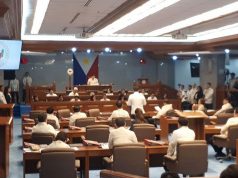Palace affirms concern by ASEAN over Chinese buildup
By Arjay L. Balinbin
MALACAÑANG has also expressed its concern over China’s continued military buildup in the West Philippine Sea after foreign ministers of the Association of Southeast Asian Nations (ASEAN) said on Tuesday, Feb. 6, that the reclamation in the area “has eroded trust among claimants and could raise tensions.”
“Oo, tama naman po yang concern na yan dahil ang hinihingi ng ASEAN bilang isang bloke tumalima sa discussion ng Code of Conduct,” Presidential Spokesperson Herminio Harry L. Roque, Jr. said in a phone patch interview with reporters on Wednesday.
(Yes, that concern is right because what the ASEAN asks for, as a bloc, is to adhere to the discussion on the Code of Conduct on the West Philippine Sea.)
Mr. Roque last Monday said the Duterte administration is keen on maintaining close ties with China despite its buildup on the disputed waters, saying “ [R]ight now the posture of the President is maintain close ties so they wouldn’t have any reason to use those arms in those islands.”
The spokesman also said what the Philippines can do for the time being is to “continue relying on China’s good faith.”
On Wednesday, Mr. Roque said the Philippine government is “not being too soft” towards China.
“We are not being too soft…(and we have) established policy on (that). Number one is we are of course one with ASEAN in recognizing that this is a concern for all ASEAN countries, the freedom of navigation in the West Philippine Sea. Number two, of course, our common concern is peace, security, and stability in one of the world’s busiest sea lanes.”
At a meeting in Singapore last Tuesday, Singapore Foreign Minister Vivian Balakrishnan said in a statement that ASEAN leaders “took note of the concerns expressed by some ministers on the land reclamations and activities in the area, which have eroded trust and confidence, increased tensions and may undermine peace, security and stability in the region.”
Some Philippine lawmakers have also criticized the administration for allowing a Chinese research group, the Institute of Oceanology of Chinese Academy of Sciences (IO-CAS), to conduct marine scientific research on Benham Rise, which formed part of the Philippines’ northeastern continental shelf.
Last Tuesday, President Rodrigo R. Duterte ordered the cessation of all marine explorations and studies by foreign scientists; however, according to Magdalo Party-list Representative Gary C. Alejano, the President’s “assertion” came too late.
“It was a knee-jerk reaction from the administration after the overwhelming opposition of the public on allowing China to conduct marine scientific research (MSR) in Benham Rise. Further, according to our sources, the Chinese vessels have already left two days ago — before this assertion by the President. The decision is therefore rendered insignificant,” Mr. Alejano said in a statement.
“As I have repeatedly forwarded before, what we need is a clear foreign policy direction with China which will guide the actions and decision-making of all concerned agencies of government. Second, I call for transparency from this administration regarding all its agreements and discussions with China. Finally, the long-term solution would be to strengthen our capacity to safeguard and monitor activities in our maritime domain,” the lawmaker added.



